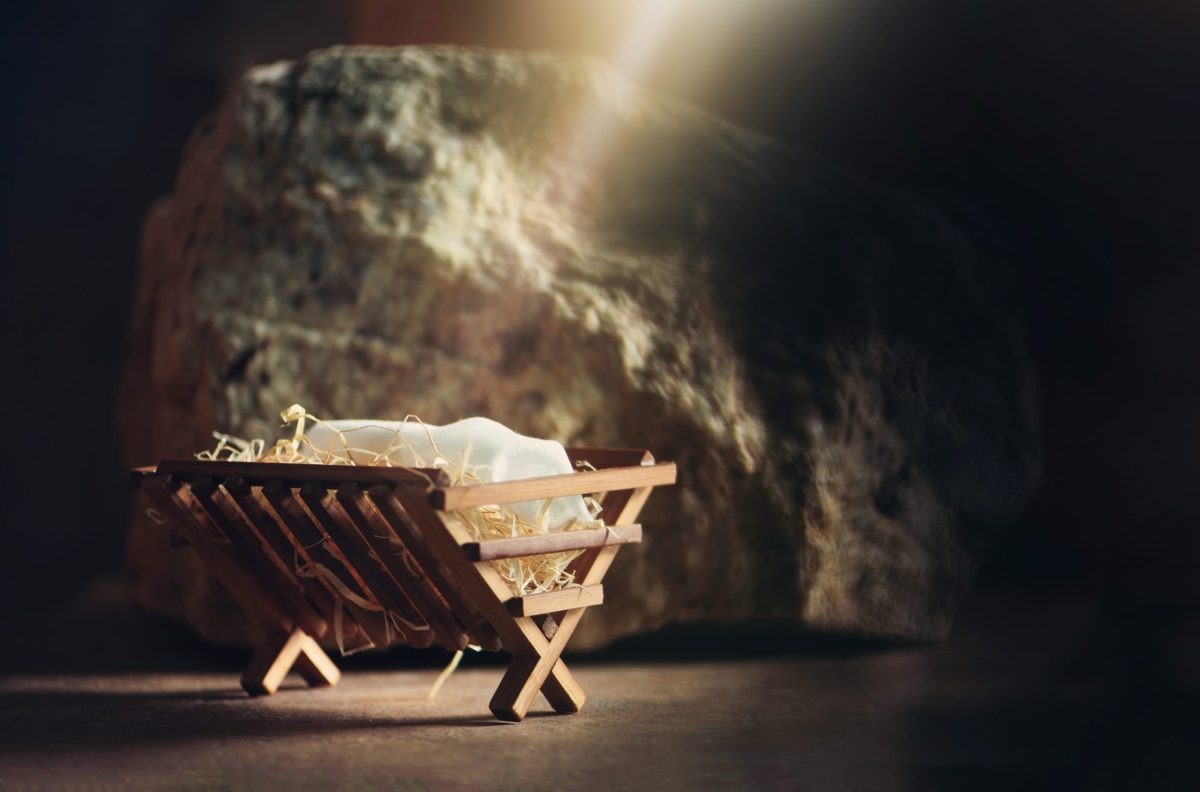Welcome to the Gospel Reverb podcast. Gospel Reverb is an audio gathering for preachers, teachers, and Bible thrill seekers. Each month, our host, Anthony Mullins, will interview a new guest to gain insights and preaching nuggets mined from select passages of Scripture in that month’s Revised Common Lectionary.
The podcast’s passion is to proclaim and boast in Jesus Christ, the one who reveals the heart of God, Father, Son, and Holy Spirit. And now onto the episode.
Anthony: Hello, friends, and welcome to the latest episode of Gospel Reverb. Gospel Reverb is a podcast devoted to bringing you insights from Scripture, found in the Revised Common Lectionary, and sharing commentary from a Christ centered and Trinitarian view.
I’m your host, Anthony Mullins, and it’s my delight to welcome our guest, Bill Vanderbush. If you ask Bill what he does, he might say something like this, “I write books, and I give talks on mystical spirituality defined in Christ.” Bill grew up in the mission field, traveling all over the world, seeing thousands impacted by the gospel of Jesus Christ.
He married his childhood best friend, Traci, in 1991. And they became parents of two amazing humans. Today, Bill and Tracy speak at conferences, churches, living rooms, and barns around the world. Bill’s consuming passion is to introduce people to the resurrection power of Jesus Christ. Hallelujah.
He enjoys empowering others to invade the impossible, which is evident in his books: Reckless Grace, Unveiled Horizon, and co-author of The Forgotten Way with Ted Dekker. Bill currently serves as a Lead Trainer for the Bethel Austin School of Ministry.
Bill, thanks for being with us and welcome to the pod. And since this is your first time on Gospel Reverb, we’d like to get to know you a little bit, your story, your backstory, and how you’re joining Jesus in his ministry these days.
[00:02:02] Bill: Anthony, thanks so much for having me on today. It is really an honor anytime I get a chance to talk about the gospel. My story, just briefly, is I grew up in a Wesleyan Methodist household. My parents were part of what they called the holiness movement, which my dad always used to say, “They only lacked two things: holiness and movement. Otherwise, they had everything covered.”
When I was about five years old, they had an encounter with the Holy Spirit that changed everything. He really said yes to something that was not approved by their denomination. And so, in the process he lost pension and just all kinds of — the price he paid just to go after something in God that was formerly forbidden.
And it was just really, I would call it the more, of God. And so, he and my mom jumped headlong into the Word of Faith movement. Which if you’re going to go from Wesleyan Methodist to Word of Faith, it’s wow! Talk about one pendulum swing to the other. And after some time in that, I ended up growing up, going to Bible college, and ended up going to pastor at an Assembly of God church.
So, I became a Pentecostal pastor for about a dozen years. That led me into a relationship with Bethel Church out of Redding, California, which they were on the fringe of the fringe, but I liked them. I thought, man, these people really have a belief that the Lord actually wants to move and move in power, and the gospel of that power is good news. So, let’s go for seeing if the greater works of Jesus can actually start to manifest in our lifetime.
So that became a reality for us. And then, from that point on, I ended up just traveling and speaking in all these different conferences that opened up all kinds of opportunities to build relationships with a wide variety of people.
And then I ended up in Florida pastoring at a Presbyterian church, of all things. Which you wonder, “what in the world, talk about a left turn!” But it was really an amazing group of people and still I consider that to be a wonderful experience. COVID killed that, and so we came back from Florida to Austin, ultimately to work at Bethel Austin here, which is a plant out of Bethel Church in Redding.
But I guess I’ve been in so many different streams over the years that I’ve started to recognize the beauty in each one of them. And rather than focus on where they have it wrong because everybody’s right about some things and wrong about others. Rather than focus on where they have it wrong, I like to celebrate what they get right. And then I feel this sort of a sense of a desire to get all God’s kids to play together nicely.
[00:04:50] Anthony: Yeah, that’s well said. And I like your approach to it because you’re right. All of us see it from a different perspective and we have something to learn from all of our brothers and sisters in Christ.
And man, you’ve had a lot of flavors, brother. You’re well informed as you come to the pod today. And the person who recommended that I have this conversation with you (hat tip to Jared), he said this about you, “Bill is very articulate. Holds to a beautiful, non-retributive, inclusive gospel, and I know he’s a great teacher of teachers.” Those are generous and kind words indeed.
But I’m interested in this beautiful non-retributive, inclusive gospel that you hold to. Tell us about it, Bill.
[00:05:36] Bill: Oh, my goodness. I live with these burning convictions in my heart, the more I have come to know the Lord, the more I’ve come to know the Holy Spirit, the Sonship being a Son of an incredible Father, and knowing his character and his nature, you begin to realize certain things about him. Things like that Jesus didn’t come to change God’s mind about us. He came to change our mind about God. And as a friend of mine says so beautifully that Jesus is God’s mind made up about us.
As you begin to realize Jesus didn’t come to pay off an angry God with the currency of his blood. He came to show us a Father, who forgives us even in our ignorance. And I watched the cross and growing up evangelical, the cross meant one thing. Now I begin to see, my goodness, the cross put an end to the sacrificial system of the Old Covenant and has absolutely destroyed my faith in my own works to qualify myself.
And so that’s really what I love to preach about is the finished work of the cross. The gospel is not transactional, it’s relational. And so, when I look at the difference between the Old Covenant and the covenant that we’re in now, the Christic covenant of Christ, I recognize the Old Covenant was made between God and man; the new covenant is made between God, the Father and God, the Son.
And by his doing, 1 Corinthians 1:30, we are in Christ Jesus. And the fullness of the finished work, you can see shadows of it within the Old Covenant. You had to have a high priest, the sacrificial lamb and God sitting on the throne received the sacrifice. But in Christ, you find every part of that offering accomplished single handedly in Jesus himself.
I don’t preach religion, in a sense, so I would say that Jesus — I don’t believe Jesus came to invent a religion called Christianity. I think he came to put an end to religion and bled us into union with the Trinity and reconciled the cosmos to himself.
He is the lamb slain from the foundation of the world. And Ephesians 1:4 says God chose us to be in Christ from before the foundation of the world. If that verse is true, then we were found in Christ before we ever got lost in Adam. I’ve been studying so much lately on the first Adam, last Adam reality, a tale of two Adams.
It’s a working title of a book I’m working on at the moment that just reveals that the first Adam was made by the last Adam and the first Adam died in the last Adam. And Jesus Christ, the last Adam, he is my sinner’s prayer, my perfect response to the Father, my altar call, my surrender, the only true believer who happens to have made his home within us, which fundamentally changes the entire makeup of our DNA, so that we are now just far more than dirt; we’re the temple of the Holy Spirit of God. I look at the cross as accomplishing far more vicariously on our behalf, not just for us, but as us, more than we could ever have imagined.
I could go on for months about this, but that’s it in a nutshell.
[00:08:53] Anthony: I wish our podcast was that long because I am just captivated by this God revealed in Jesus Christ. And I love what you said, he does for us what we can’t and could not do for ourselves. Who among us prays without ceasing? There is one, our great high priest who is the better high priest, who is even now interceding with the Spirit on our behalf.
And he lived the life we could not live and died the death we could not die. Hallelujah. He was raised to new life. And I love talking about this vicarious humanity of Christ. I think that’s going to come out in our passages.
We’re in the season of Advent, which sometimes for people looks like just a precursor to Christmas. It’s just the prep time, but there was distress in the people’s hearts waiting, longing for this salvation to arrive on the scene.
And that’s what we’re going to look at here today.
So, let’s dive into the lectionary passages. Our first text of the month is Luke 21:25-36. I’ll be reading from the New Revised Standard Version, the Updated Edition. It is a Revised Common Lectionary passage for the first Sunday of Advent, December 1.
There will be signs in the sun, the moon, and the stars and on the earth distress among nations confused by the roaring of the sea and the waves. 26 People will faint from fear and foreboding of what is coming upon the world, for the powers of the heavens will be shaken. 27 Then they will see ‘the Son of Man coming in a cloud’ with power and great glory. 28 Now when these things begin to take place, stand up and raise your heads, because your redemption is drawing near.” 29 Then he told them a parable: “Look at the fig tree and all the trees; 30 as soon as they sprout leaves you can see for yourselves and know that summer is already near. 31 So also, when you see these things taking place, you know that the kingdom of God is near. 32 Truly I tell you, this generation will not pass away until all things have taken place. 33 Heaven and earth will pass away, but my words will not pass away. 34 “Be on guard so that your hearts are not weighed down with dissipation and drunkenness and the worries of this life and that day does not catch you unexpectedly, 35 like a trap. For it will come upon all who live on the face of the whole earth. 36 Be alert at all times, praying that you may have the strength to escape all these things that will take place and to stand before the Son of Man.
Bill, verse 28 heralds that redemption is drawing near because the Son of Man is drawing near. So, tell us more about this good news in the midst of what looks like a very troubling scene found in this pericope.
[00:11:37] Bill: Yeah. For me, I look at this and I go, okay, wait. First off, I operate from a posture of no distance or no separation. So, the redemption drawing near is me coming to a revelation — I think, really all of humanity coming to a revelation that we do not live independently of the One who is the Word made flesh, who’s speaking us, not just into existence, but holding us together by the very power of his being.
And the nearness, the whole nearness concept to me is beautiful. I think little by little, Jesus is whittling away at every veil of distance and separation between us and him. When Jesus on the cross [says], it is finished, and that veil tore from top to bottom, I like to ask the question, did it let God out or did it let man in?
And the answer is yes, removed every barrier of distance and separation. And I find it so almost humorously ironic how 2000 years after that veil was torn and the promise of the Holy Spirit has come upon us and every letter of Paul speaks of “Christ in us, in him,” all of the union language that the scripture so blatantly has put before us that, especially in Western Christianity, everywhere I go, I find Christians trying to get closer and closer to a God who actually lives in them.
And I realized that revelation of reconciled union doesn’t come from striving, it comes from surrender. I look at the nearness part and I just go, oh, that’s beautiful, how wonderful it is that he is inviting us into this place of union. It’s a fullness of John 14:20. “And that day you’ll know I’m in the Father and you are in me. And I am in you.” But if I’m going to take this entire verse in context of the passage, I’ve got to realize we’re dealing with eschatology here. [Eschatology is the part of theology concerned with death, judgment, and the final destiny of humankind.]
So, between this and Luke and Matthew 24, this is where I’m going to claim a little bit of ignorance when it comes to eschatology because it is admittedly my least favorite thing to study in Scripture as opposed to the present reality of our union with Christ and our reconciliation with Christ. I don’t hang too much with a crowd that’s constantly looking for something way off in the distance, especially something to the negative.
So, three decades of study of the scriptures and history has me holding to a partial bit of a partial preterist view of eschatology where I see that what’s being written about here, contextually, most certainly in their future, yet much of it is in our past. [Preterism is a Christian eschatological view or belief that interprets some or all prophecies of the Bible as events which have already been fulfilled in history.]
And so, I believe much of the prophecy that’s spoken of here in Matthew 24 is regarding the end of the Old Covenant age where they talk about the appearance of Christ. I think he appears in us before he appears to us, and I think Colossians 3 bears this out. In the scriptures, we know that we will, when we see him, we’ll be like him, for we’ll see him as he is. There’s something happening of Christ being conformed in us, and he’s the one that’s doing the work.
Having said all that, I look at this and I think of Jesus saying heaven and earth will pass away, but my words will not pass away as he’s walking by the temple. And the “heaven and earth” being a euphemism for the Old Covenant system; the temple, it was heaven and earth.
And he says, there won’t be one stone left upon another here that will not be thrown down. And the disciples ask him the question, when will these things be, when will this specific thing happen? And then he goes on to begin to talk about some signs — that you see, the majority of them, fulfilled within the context of the destruction of Jerusalem in AD 70.
After reading so much of the history, it’s mind blowing how you begin to see the fulfillment of so much of what Jesus spoke about in that day. And so as bears out here, this generation shall not pass before these things be fulfilled. So, they were fully believing that it was for them that he was speaking, and I think he is definitely prophesying to the end of the Old Covenant age to usher in a new covenant reality. And that is what we’re in.
I’d say the last 2,000 years, that God hasn’t dropped the hammer of judgment on humanity a single time, as far as I can tell, collectively as a nation, or the people of God, for the last 2, 000 years.
And people say, why do you believe that is? Because the cross actually worked. That there was something that happened on the cross that brought us into a place of union with Christ, where now, according to Hebrews 12, he deals with us individually. But it’s for the purpose of correction, not pure punishment.
There’s something about all of this eschatology that brings me more hope than — it used to bring me a ton of fear and foreboding. And now I find this radical sense of hope. And that is the one thing that seems to be still out there is the physical return of Christ, the physical embodiment of Christ, and so that to me is the one eschatological variant that still has yet to be fully manifest in us and to us.
And I think in Matthew 24:14 where Jesus says, “This gospel of the kingdom must be preached as witness to all nations then shall the end come.” And I realized there’s the one area where we have been given an assignment. And so, to get the gospel right, the gospel of the kingdom, the realm of the king’s domain, the fact that Jesus is king overall. Romans 10:9-10, we think is the litmus test for soteriology [the doctrine of salvation] of who’s in and who’s out kind of thing. But I don’t see it that way at all.
I’d see it just as an acknowledgement of a reality because both of the things Romans 10:9-10 talk about are in the past. “You confess with your mouth, Jesus is Lord. You believe in your heart, God raised him from the dead.” He already is Lord. Paul told Timothy, “He’s the Savior of all men, especially those who believe,” and he already rose from the dead. So, what Paul’s inviting us into is not a metaphysical mantra where if we speak this, then Jesus will somehow jump in your heart.
If Jesus lives in you, you didn’t put him there. And this is simply an acknowledgment of reality. This is an invitation to step out of the delusion that we live isolated and apart from God in anything other than in our own ignorance and our own mind and into in an embrace of what the cross actually accomplished.
And people are really — I think they read these passages, and they go, “Oh my goodness! We need Jesus to show up and fix everything.” And I’m like, “Hey, the cross actually worked. And perhaps the reason that we’re pining for the Jesus to come is because we’re disappointed with the Jesus that came.”
And so maybe if we can begin to see what the cross accomplished and walk in the fullness of the reality of that, maybe then when Christ appears to us, then we will be like him. We’ll see him as he is. There’ll be a manifestation that’s a convergence between us. So as in beholding him as in a mirror where it changed from glory to glory, and there’s something about us that has to be transformed in the revelation of what the cross did.
And that’s why I preached the fullness of the finished work, the goodness of God undiluted. I think it was — I can’t remember if it was Brendan Manning or Rene Girard said, or Robert Capon said, “Grace has to be drunk straight.” [That is a Capon quote.]
[00:19:15] Anthony: Sounds like a Capon statement. Yeah, absolutely. You said that Christ will appear in us before he appears to us. And that reminded me of a Thomas Merton quote, and I’m paraphrasing, but he says something to the effect that Lord, may we arrive where we’ve already arrived. Just keep leaning into what is the reality, the substance of that reality, that we are in you and you are in us.
And may we know that. And as we’re going to talk about here in just a moment (you’ve already alluded to it), Jesus’s words don’t pass away. And what did he say more than anything else? Fear not. So why would we preach eschatology, the end thing in a fearful way? If he kept saying over and over “fear not,” is that not what he’s going to continue to say and remind us of?
And I think when we strip the eschaton, the end, who is Jesus from eschatology, that’s where it becomes problematic because we read these words and we go, “Oh, this is bad.” The judgment has already happened in the personal work of Jesus, and he has accepted us.
[00:20:23] Bill: And you know how rare it is to hear somebody actually say that in human language.
[00:20:30] Bill: It’s really a beautiful thing. I love this, Anthony.
[00:20:33] Anthony: Yeah. Amen, brother. We did say this, his words won’t pass away, verse 33. And yet here’s the thing, Bill. Sometimes I hear Christians who think Jesus’ words are not practical or relevant. They don’t work in our society. And I’m thinking specifically of the Sermon of the Mount.
So, I don’t know, can we flesh this out a little bit more? What do you say about Christ’s words now here in the season of Advent?
[00:21:02] Bill: Let’s go to the identity of who he is. So, before I address specifically the question, let me lay a foundation like this. I think a lot of people, especially in Western Christianity, I believe the gospel is about a place called heaven, and then Jesus becomes just the means to the end. Heaven is the ultimate goal, and Jesus is just the somehow the means to get you in. And when the gospel is about a place, then you need that place to be gated.
In other words, it’s who’s kept out that actually makes you feel special because if everybody’s let in, then it’s just not special, right? And so, then the gospel becomes about an us and them mentality. And I think that’s really rooted in seeing the gospel is more about a place than about a person.
But I believe ultimately, the gospel is about a person. “All is in Christ” is going to be the foundation of the answer to this question. Colossians, I believe, 3:11, Christ is all and in all.
You and I have this invitation to a reality that he is literally holding everything together. So, heaven is Jesus and Jesus is heaven.
And I’m not denying the existence of a heaven. I’m saying that ultimately, he is the goal. And when the gospel is about a person and not about a place, then you know that when that person is revealed to be your Father and he’s ultimately good — always good, and always has been, always will be good, then you look at every person that’s walking around as if they’re an orphan or without any sense of meaning or purpose.
And you go, I want them to be a part of this family as well. And so, your heart turns toward a much more inclusive posture than an exclusive us and them mentality. And so, I think really, it’s rooted in that idea of, for people, if they really search their heart, is the gospel about a place or is it about a person?
Now, having said that, let’s draw to the attention of the One who is the Word, the person, right? And are his words relevant today? He is the Word who is literally holding us all together on this subatomic level, right? And that which holds us together never ceases to be relevant.
I don’t imagine Jesus’ words to us would change much more from what he spoke to first century Jews, especially something along the lines of “a new commandment I give you, and that is to love one another as I have loved you.” Under an Old Covenant, you love to the best of your own ability, love the Lord your God with all your heart, mind, soul, and strength; love your neighbor as yourself. In other words, you love as good as you can. Under the new covenant, you love like Jesus.
[00:23:35] Anthony: Yes.
[00:23:35] Bill: And that requires a revelation of union because now he’s got to be the one that is actually loving through me. And so, I think the transcending capacity to love like Jesus is only possible from the foundational established relationship that we have with him from that posture of reconciled rest at union in the heart of the Father.
One of the things that Western evangelicalism has gotten right is the encouragement toward people to pray. And again, I don’t believe in some formulaic sinner’s prayer that becomes this golden ticket to a relationship with God, but rather our first prayer is meant to be the beginning of an eternal conversation, deepens the relationship and transforms us from the inside out.
I think Jesus came to correct all of our misconceptions about God. We carry a ton of misinformation and disinformation and that passed down from generation to generation, lingered long enough to become tradition. But with the coming of the Holy Spirit, the one who is the Word now dwells with and within us.
And so, the Spirit of truth has united himself to us. And that reconciliation will minister through us to the world around us if we will allow him. I think there are two strong factors at play by which you can tell that someone has that active and present relationship with the resurrected Christ.
And that is love and rest. The world will know, the Bible says, we’re followers of Jesus by the love that we have one for another. And in the revelation of our reconciled union with God by the finished work of the cross, my goodness, my heart is put at a place of rest, Anthony. And when those factors are in place, righteousness, peace, and the joy of the kingdom becomes an overflowing reality and not just merely a byproduct of my white knuckling down to religious discipline.
If that makes sense.
[00:25:42] Anthony: It does. That’s well stated. And it reminded me — focusing on the person rather than a place — of a quote from J. B. Torrance. I’ve used this before, but it’s so powerful. He spoke it in one of his final lectures to his students, but he said this. “What we need is not a new doctrine or a clear doctrine of the Holy Spirit. We need the Holy Spirit. What we need is not a better Christology. What we need is Christ. What we need is not Trinitarian doctrine, but a relationship with the Trinity itself.” And that is the difference. It is a person. It is a relationship, a personal God relating personally with us by the Spirit.
Yeah. So, everything you said.
[00:26:28] Bill: My favorite Torrance quote.
[00:26:30] Anthony: Yeah.
Let’s transition now to our second passage of the month. It is Luke 1:68-79. It is a Revised Common Lectionary passage for the Second Sunday of Advent on December 8. Bill, we’d be grateful if you’d read it for us.
[00:26:49] Bill: Sure will.
“Blessed be the Lord God of Israel, for he has looked favorably on his people and redeemed them. 69 He has raised up a mighty savior for us in the house of his child David, 70 as he spoke through the mouth of his holy prophets from of old, 71that we would be saved from our enemies and from the hand of all who hate us. 72 Thus he has shown the mercy promised to our ancestors and has remembered his holy covenant, 73 the oath that he swore to our ancestor Abraham, to grant us 74 that we, being rescued from the hands of our enemies, might serve him without fear, 75 in holiness and righteousness in his presence all our days. 76 And you, child, will be called the prophet of the Most High, for you will go before the Lord to prepare his ways, 77 to give his people knowledge of salvation by the forgiveness of their sins. 78 Because of the tender mercy of our God, the dawn from on high will break upon us, 79 to shine upon those who sit in darkness and in the shadow of death, to guide our feet into the way of peace.”
[00:28:00] Anthony: I’m going to pitch you a softball here. Bill, tell us about the good news declared in this passage.
[00:28:06] Bill: Okay. There’re so many incredible words in this passage. Let’s go back to the beginning of it. I love the word favorably because it reveals the gaze of God. I think about that.
You picture the Lord looking down upon us. What do we picture? A scowl, disappointment, anger, a disapproving look. I imagine there are many people who do. And yet, to imagine rightly is to see the Lord looking favorably upon us. Not merely gazing at our behavior with judgment but looking with the loving eyes of a Father upon his own child, made in his image and likeness.
Beyond even the gaze of favor, you see the result is that we are redeemed. And I love the word redeemed, the English word, beautiful word, the word redeemed. And you can break it into two words, re and deemed, “deemed again.” And the world and the people around you might have deemed us unworthy; you might feel you’re deemed unworthy.
And perhaps people have even deemed themselves unworthy, but the redemptive nature of God revealed in Christ re deems you. So, we are redeemed as worthy by him, and I think we find that in the favor of his face.
This next part, I would say, in the verse, if I go through the words here, speaks of the Messiah, our Savior, being raised up from the house of David.
That part stands out to me. I look at the grace of God to be identified with David, whose story represents the Father’s heart of God, to choose from the family of Jesse, the lowliest and the last, to lead the nation. Who would have ever imagined that salvation, the forgiveness of sins would extend even far beyond Israel to cover the whole earth.
I think of Simeon who came into the temple to hold Jesus only eight days old and draws from the Old Covenant prophets. He calls him the glory of Israel and light to the Gentiles. And that light shines on all who sit in darkness in the shadow of death. And if we’re truly following him, then as the passage finishes out, we find the way of peace.
It isn’t, really, that what everybody wants anyway?
[00:30:17] Anthony: Yeah, I’m just drinking in what you said. I’m really stuck on this whole favorable gaze because I grew up, Bill, with the idea that God was really ticked off and disappointed. And God, I’m okay if you stay in your corner and I’ll just stay be over here in my corner, and it’s okay if you don’t want to come on over here because I know you’re disappointed and you disapprove of my behavior. So, to think that I can look into the face of God and know that he looks upon me favorably.
I don’t think I’ll — I continue to arrive to that, like I’ll take that to my death. I’m still trying to believe, not that I don’t believe, but I want to believe fully that is true. Because as you said, so many have deemed me, or I’ve deemed myself otherwise.
So that’s a good word.
[00:31:11] Bill: Many years ago, I was traveling in Europe with a dear friend of mine named Godfrey Birtle, and I’ve said a couple of things that Godfrey ended up writing songs about, but he has a song. He’s just such a fun worship leader. And he’s got a lot of stuff on iTunes and Spotify.
And he has a song called, “I Am Not Disappointed in You.” It came out of just us sitting and having conversations about this, about the revelation that a God who’s known us from before the foundation of the world, who knew us before he formed us, hasn’t changed his mind about us, no matter what our warped perception of ourself actually is.
And that song has a line in it where he says, “I’m not disillusioned with you,” speaking from God’s perspective. “I’m not disillusioned with you. I never had any illusions to begin with.”
[00:32:00] Anthony: Yes. I’ve heard Paul Young say that. I love that. I just love that. I love that line.
Let’s make this personal. Bill, verse 78 talks about the tender mercy of God’s leading to a new dawn. Can you tell us about a time you personally experienced the tender mercy of God and what impact did that have on not only your understanding, but your experiential love of God revealed in Jesus Christ?
[00:32:30] Bill: Yeah. Wow. There’re so many places I could draw from. I would say though, that My dad had a stroke in 2008, and he was a minister of the gospel, best communicator of the gospel I ever heard.
Honestly, the same guy on the stage as he was off the stage. There was nothing remotely hypocritical about him at all. When he had this stroke we prayed for healing — every evangelist, every minister coming through, we dunked him in so much oil. We did all this stuff; he did all the things you do and didn’t see any breakthrough in that.
And really, I went into a state of disillusionment. That was strange for me because I had preached for years about not being offended at God and yet here I found myself in that state of being offended at God. And the result of that for me was I didn’t know what I believed.
And if my faith in Christ wasn’t real and this wasn’t true, what else was a lie? Everything in my life, ministry, even down to marriage and everything, , had been the center of all of it. God had been the center of everything. And as, as my revelation of him was starting to take a hit, it started having ripple effects throughout my entire life, and I began to realize the foundational aspect of this was, for me, it was a safety net until it wasn’t.
And so, man I set out to — I just embraced full on offense against God in so many different ways in my life. And it culminated with — it’s a hard thing to admit, strange thing to admit, but it culminated with me really working hard at doing just about everything to commit the unpardonable sin.
I run into people all the time who are scared to death, “If I committed the unpardonable sin, if I committed the unforgivable sin.” I can say, I gave it a shot. I gave it a really, I gave it a good effort. And in the end, Anthony, all I found was grace. I really felt like the Lord said one day, “You haven’t murdered me yet. And that’s already been done. What’d you do to those people? Father, forgive them. They don’t even know what they’re doing. Come on.”
And during that time, my wife, Traci became probably the kindest expression of the grace of God I’d ever experienced in my life during that time. And it was her kindness that led me to a place of repentance.
I think of people often that think, well, I’m — perhaps people point to their own sense of being in Christ by their works, and I would say to people whose marriage has ever been like shaky: Is it your work or is it their grace that enabled you to still have a marriage covenant?
Using that as an example, I would say, if anybody says, “it’s my work,” then they’re delusional. Because if the person that has a responsibility to forgive doesn’t give you grace, it doesn’t matter how much you work. But if you don’t do any work, and the person who has a responsibility to give the grace gives just a little bit of grace, it can work.
So, the giver of the grace always carries the greater power. And that’s the point to which I begin to realize it’s not my work that qualifies me for righteousness and redemptions, purely the grace and the goodness of God.
And I also began to realize some things about my dad’s condition that I had an offense, but I was taking offense for a battle that I wasn’t called to fight. He was totally fine. He never lost anything in terms of his joy toward the Lord, even when his speech was reduced to nothing but praise. Like the last five years of his life, he only could say five phrases. And the doctor would tell us because of the stroke he had, the very core of his being is going to come out, so whatever is down there that’s been suppressed all these years is going to come to the surface.
And I thought, Oh, goodness. Yeah. What’s a guy with that going to do? Well, for the last five years of his life, all he said was praise the Lord, hallelujah, thank you, Jesus, yes, Lord, and amen. And he just repeated those phrases.
So, his entire vocabulary is reduced to nothing but praise to God. So, his relationship with God was solid even through this whole thing where his mind was so deeply affected, the core of his being was that. And I began to realize when it was all said and done, what God was working out was something in the core of my being, lies that I believed about my own identity and about who God is, that once rooted out by the grace of God, put me at a state that I had never experienced ever in my whole life, for longer than ten minutes. And that was a state of rest.
And that is where I have been living ever since then. That was many years ago. But it is the foundation of really where I stand now.
[00:37:36] Anthony: That’s beautiful. It’s humbling that you would share that with us. Thank you for trusting us with that story. And I just, my heart leapt as I heard those phrases that your dad spoke from the core of who he is.
And you made the statement, Bill, that it was kindness, God’s kindness that led you to repentance. And isn’t that the way it is? Not the other way around that repentance leads us to God’s kindness, or as J.B. Torrance would say it, “repentance is a response to grace, not a condition of grace.” It’s the God that shows us such beautiful kindness and tender mercy that draws. That’s what draws people.
That’s what love does. Not correcting them, not challenging them. It’s not having the bull horn on the corner that’s going to draw them to God. It’s acts of love. Yeah. That’s beautiful.
Let’s move on to our next passage of the month. It’s Luke 3:7-18. It is a Revised Common Lectionary passage for the Third Sunday of Advent on December 15. And it reads,
John said to the crowds coming out to be baptized by him, “You brood of vipers! Who warned you to flee from the coming wrath? 8 Therefore, bear fruits worthy of repentance, and do not begin to say to yourselves, ‘We have Abraham as our ancestor,’ for I tell you, God is able from these stones to raise up children to Abraham. 9 Even now the ax is lying at the root of the trees; therefore every tree that does not bear good fruit will be cut down and thrown into the fire.” 10 And the crowds asked him, “What, then, should we do?” 11 In reply he said to them, “Whoever has two coats must share with anyone who has none, and whoever has food must do likewise.” 12 Even tax collectors came to be baptized, and they asked him, “Teacher, what should we do?” 13 He said to them, “Collect no more than the amount prescribed for you.” 14 Soldiers also asked him, “And we, what should we do?” He said to them, “Do not extort money from anyone by threats or false accusation, and be satisfied with your wages.” 15 As the people were filled with expectation and all were questioning in their hearts concerning John, whether he might be the Messiah, 16 John answered all of them by saying, “I baptize you with water, but one who is more powerful than I is coming; I am not worthy to untie the strap of his sandals. He will baptize you with the Holy Spirit and fire. 17 His winnowing fork is in his hand to clear his threshing floor and to gather the wheat into his granary, but the chaff he will burn with unquenchable fire.”
So, Bill, help us understand about this repentance. We just talked about the kindness leading to repentance but tell us about the fruits worthy of that repentance.
[00:40:34] Bill: I love what you just said that the Bible teaches it’s the kindness of God that leads us to repentance. And I think you rightly stated, we have perhaps come to believe that it is our repentance that accesses the kindness of God.
But the initiation on his end is grace. I think of Jesus rising from the dead and rather than going and exacting revenge upon his enemies, which it probably is what I would do, would have done. Instead, he just wants to go and hang out with people who want to hang out with him.
[00:41:07] Anthony: Yes.
[00:41:08] Bill: And that to me is a beautiful picture of the heartbeat of the Father. I think of the grace of God being an invitation to a transformation, not by our works, but rather by our surrender to his work. And probably the best example of this is the parable of the prodigal son. And I think of in the story that Jesus tells there, the son stays away from the father’s house, enduring the hog pen because his actions had somehow — you can see the warping of his identity from a son to a servant or a slave in his mind. I think of it like this, that sin doesn’t change God’s mind about us, but it does change our mind about God, which is why it’s such a bad idea. So, if a person engages, let’s say routinely engages in pornography, their identity is meant to be protector, but over the course of time, it changes into predator.
That’s not what God ever meant for a person to be, and that’s not the way he thinks of us, no matter what we do or have done. So, his perspective of us has got to be the identifying factor that doesn’t just change our perspective about ourselves but influences our behavior when it comes to discovering really who we are.
And who am I as a protector? I guess it’d be the question. I think of the prodigal son: who is he? Is he a son of his father? And he says, no, I’m not even worthy of that; the best I can be is a servant. And so, then he returns home and discovers that his perception of his own identity has no basis in reality.
And I think it’s often that fear keeps us locked in a slavery or servant mentality and robs us of our identity as a son enjoying the father’s house. And the thing about the story that is so fascinating is even when the son tries not to be a son, the father never stops being father. The prodigal was always a son.
So, when you look at that guy’s repentance — I love how Jesus puts it in the story, this guy’s repentance. The way Jesus tells the story, the kid’s not sorrowful at all for what he’s done, as if it was like a bad thing where he did something evil. He only comes home because he’s tired of eating hog food and has no place else to go.
And that’s not good repentance by our standards of repentance. But what he runs into when he gets home becomes the change factor. And I can’t remember who said this quote, but the quote that comes to mind here (I have to go back and find out who to attribute this to), but it’s “only love that cannot be changed by our behavior has the power to change our behavior.”
So, agreeing with the unchangeable love of God, for us is the most powerful form of repentance. What is repentance? Being sorrowful and upset at sin? No, it’s just agreeing with God’s unchangeable love for you and then letting that love transform you. Metanoia, renewing of our mind. That’s ultimately what empowers us to live free from every hog pen in this life.
A lot of people say grace becomes your license to sin. No, grace is the empowerment to walk free from it. So, it’s not that I have a free will, I have a freed will, I have a liberated will and only a truly liberated, freed will can say yes to, to Christ in his fullness.
Otherwise, listen, otherwise what we’ll end up doing is we’ll end up chasing people to God through fear. And so, people come to say yes to Jesus through a fear of hell, not a love for Christ. And that becomes often the foundation of people’s relationship with God.
So, to begin a relationship with God from a posture of fear of ever getting to actually know him, it’s “thanks for rescuing me from an eternity of torment, but I’m super scared of you because I understand that you have the power to cut me off at any moment. I would call a person in that state of mind, I would say it’s like a spiritual foster child. That is, you’re in the house, but you don’t necessarily feel like you’re part of it; I feel like an outsider even though I’m an insider because I know at any moment, Dad could tear up the paperwork and throw me out into the street back out into the system.
And that’s not the way the kingdom of God works. We’ve received the spirit of adoption, and we’ve been bled into this thing. We’re twice as much a child of God as we could ever be a child of any human being. And that’s all his doing. To come to a realization of that, my goodness! That’s what empowers me to live free from sin, the hog pens and all the junk in this life.
And when we see that, then we can walk as the sons and daughters that we not are becoming but have always been.
[00:45:50] Anthony: Yeah, and of course it is the Spirit that is revealing and pointing us to truth. That’s what the Spirit does. And I hadn’t planned to ask you this question, but I will.
What’s your understanding of the Spirit? What’s your pneumatology? John says there’s going to be one who comes and baptizes you by the Holy Spirit. What’s the spirit doing?
[00:46:13] Bill: That’s a great question. This is a topic that I love talking about because there’s no revelation of union without an understanding of the indwelling Holy Spirit, the person of the Holy Spirit, not some in theory, ethereal fog, third person of the Trinity. And I think of the Trinity is the picture of the human family. We’re not made in the image and likeness of God so much as an individual, but as a relationship, an other-centered, self-giving relationship of love. Father, mother, child, Father, Spirit, Son. Holy Spirit is, he says, the mother heart of God. It’s the comforter, the guide, all the things that I am not in the family as the father protective, provider. My wife is the comforter and the guide.
So, I begin to see that there’s a beautiful picture though, of this indwelling union that we have with Christ that’s revealed in the Holy Spirit. I’ll just pull one aspect of understanding of the Spirit out of — I wrote a book called Reckless Grace many years ago, and it was based out of John 20:23, where Jesus says, whoever sins, if you forgive them, they’re forgiven.
It’s just a mysterious passage of Scripture. And as if we’re brokers of the grace of God. Imagine that. But right before that, the Bible says, Jesus breathes on the disciples and says, receive the Holy Spirit. We always think of the coming of the Holy Spirit in Acts 2 like that’s when the Holy Spirit came. But when he said receive the Holy Spirit, he wasn’t just dangling a carrot out in front of them that that was something that was going to happen in Acts 2.
I think that moment of the indwelling awareness of the presence of the Holy Spirit came upon us in that moment. We find ourselves able to be aware of the presence of God through the power of the Holy Spirit, as close as our breath. But then Jesus in Acts 1 says, wait, you go to Jerusalem and wait until you’re filled with power from on high.
So, I see a bit of a distinction between the person and the function. I see the presence of the Holy Spirit is available for every single person that will just turn their affection and attention toward the Lord. Whatever has your attention has your affection. But then the power of the Holy Spirit, the actual power of the Holy Spirit moving through us.
What’s the distinction in that? I think of Jesus with the disciples, who in Luke 9:1, Matthew 10:1 says guys, I give you power and authority, behold, I give you power and authority. And then he sends them out to cast out demons, heal the sick, and do all these amazing things. And if we think that you need to be special in order to do that, just consider the fact that none of those guys were believers because Jesus hadn’t gone to the cross and bled, died for our sins, or anything like that.
They didn’t even know he was the Son of God. They’re just blindly following the statements that he said. That seemed to empower them to do the same thing that he did. And they went out and did incredible things.
So, people say you walk in the power of God, you got to be extra special. I don’t think that’s the case at all. I think it’s a product of surrender.
And so, the 120 that end up in the upper room for 10 days have no idea how long they’re supposed to stay there. They have no idea how long or what’s supposed to happen. And yet when the Holy Spirit falls upon them, what happens as a result of that is a proclamation of throughout the book of Acts the resurrection of Christ, and the forgiveness of sins brings an invitation for every person who listens, who says yes to that, to have an experience and encounter with the Holy Spirit.
You see this in Acts 10, we’re in the house of Cornelius. Peter gets up, and he starts preaching the gospel. Jesus died, he rose from the dead and now offers forgiveness of sin. Boom, the Holy Spirit falls on the room and Peter goes, my goodness, this is happening exactly like us. Those guys didn’t have to wait for 10 days. So, I see that what the Lord invited that 120 into, that they paid a price for, becomes the inheritance of every child of God, every person for free just simply by agreeing with God.
That to me is a beautiful reality. And I’m so blessed to have come across a number of people in my life who have said I think the gospel is more than just for the afterlife; it’s got to be for my whole life. And so therefore we’re going to continue to go after seeing the power of Jesus move through us to impact the world around us. It doesn’t mean that we control it.
It doesn’t mean that we do it apart or independently of the Lord. People say, how do you heal the sick? I don’t I introduced them to the One who does. But that can only happen through the indwelling power of the Holy Spirit. Often being in a public place and all of a sudden you get this nudge, this impression like the wind that we’re all familiar with, but I can’t really explain, filling the sails of the boat of your life, moving you in a particular direction toward praying for someone, sharing the gospel with someone. The way I say it is “the power of God will move through you as compassion of the Lord moves through you, and when you invite his compassion to move through, you might be surprised what he does to your heart.”
Or the old adage says, break my heart for what breaks yours, right? So suddenly my heart moves with compassion. Now to understand why I’m feeling this overwhelming compassion for a complete stranger or for the situation or whatever, if I will move in the direction of that compassion, then I begin to realize I’m walking in power.
And otherwise, we end up going by duty. I think of Jesus going through (and this is a long answer to a short question, I know), but I think of Jesus saying, “I only do what I see the Father do and say what I hear the Father say.” And I think of him moving through life fully empowered to bring healing to every single person that he ever comes in contact with.
But he doesn’t walk in any town going, let’s go and empty out the hospitals. He goes through town just living in reconciled rest, in the heart of the Father as a demonstration of how to do life as a human being. And what happens?
You got the woman with the issue of blood comes up behind him like he’s walking away from her to lay hold of what he carries. You got blind Bartimaeus who has to call out for him who walked by. And so, the example I look at there is if the need is the call, I will go broke and I will never sleep. I’ll put myself in an early grave trying to somehow go out and fix all the problems.
But I realized, wait a minute. My job is to be loved by God and to live loved in this world, walking in reconciled rest in union with the heart of the Father. And when you walk aware of what you carry, you’d be surprised that people around you will put a demand on what you carry, but they’re not asking something of you; they’re asking of something that goes deeper than just your humanity. They’re putting a draw on the Holy Spirit of God within you so that you’re never without a solution to a problem.
So many things I could tell you to talk about regarding this, but I think of one quick example in the story. A dear friend of mine named Joaquin Evans, when he came to Christ, he pastors here at a church I serve at here in Bethel, Austin, and he came to Christ, and he started seeing incredible miracles happen through him.
He was just so surrendered to the love of God. Couldn’t believe that the Lord would grace him with so much, just so much love, so much grace, so much forgiveness. And he just started giving it away to everybody around him. As he started giving grace away, healing started happening, crazy healings started happening.
A lot of people around him looked at the healing that was happening to him and thought well, God favors him more. He’s got more power than we do. As if the Holy spirit is sliced up like a pie given out in portions, right?
And he knew that wasn’t the case; we decided in the time of prayer, just ask the Lord a question. Why am I seeing more breakthrough than all the people around me who I know love you? They’re saved. They’re even filled with the Holy Spirit. But why am I seeing more breakthrough? And he said, as clear as you could hear an audible voice speak internally, audibly, God spoke to him and says, “It’s because you let me love you.”
It’s because you let me love you. And I realized the greatest definition I’ve ever pondered for “belief” is to offer no resistance. Unbelief is just resistance to truth. And to offer no resistance, to the love of God is to basically say, God you have the freedom to love me, and I teach me how to receive your love.
There’s a good prayer to pray. That’s good language to come to a heart of surrender. Say, teach me how to receive that love. My understanding of the Holy Spirit is that he woos, like the wind of a beautiful hurricane, I could say. It just blows away all the junk that I’ve put up as a barrier between me and the love of God.
[00:55:10] Anthony: Yeah, I’m just hooked on what you said about receiving that love and may I not be a barrier in any way to that love. Often, I’m my own worst enemy in that way.
And this is one of the reasons as we transition to our final pericope of the month, I’m struck by Mary. Even though what she was being told was like, “Oh, what?!” There was no hindrance to what the Lord was going to do by the Holy Spirit as the Spirit came over her.
So, let’s talk about that.
Our final passage of the month is Luke 1:39-55. It’s the Revised Common Lectionary passage for the Fourth Sunday of Advent which is December 22. And I’d be grateful, Bill, if you’d read these powerful words.
[00:56:01] Bill: I’d love to, from Luke 1, starting in verse 39.
In those days Mary set out and went with haste to a Judean town in the hill country, 40 where she entered the house of Zechariah and greeted Elizabeth. 41 When Elizabeth heard Mary’s greeting, the child leaped in her womb. And Elizabeth was filled with the Holy Spirit 42 and exclaimed with a loud cry, “Blessed are you among women, and blessed is the fruit of your womb. 43 And why has this happened to me, that the mother of my Lord comes to me? 44 For as soon as I heard the sound of your greeting, the child in my womb leaped for joy. 45 And blessed is she who believed that there would be a fulfillment of what was spoken to her by the Lord.” 46 And Mary said, “My soul magnifies the Lord, 47and my spirit rejoices in God my Savior, 48 for he has looked with favor on the lowly state of his servant. Surely from now on all generations will call me blessed, 49 for the Mighty One has done great things for me, and holy is his name;
50 indeed, his mercy is for those who fear him from generation to generation. 51 He has shown strength with his arm; he has scattered the proud in the imagination of their hearts. 52 He has brought down the powerful from their thrones and lifted up the lowly; 53 he has filled the hungry with good things and sent the rich away empty. 54 He has come to the aid of his child Israel, in remembrance of his mercy, 55 according to the promise he made to our ancestors, to Abraham and to his descendants forever.”
[00:57:38] Anthony: Good news.
[00:57:38] Bill: Indeed.
[00:57:39] Anthony: Yeah. For the sake of time, I’m just going to ask you a single question, but I’ll invite it to be the comprehensive one.
If you were preaching this text, let’s just say in Bethel Austin, what would be your emphasis of the sermon?
[00:57:54] Bill: You got to go to the phrase that we always, I think, find ourselves in the Magnificat. “My soul magnifies the Lord. My spirit rejoices in God, my Savior.”
Has there ever been a more pure expression in the English language (we could say or in any language) of human worship than was ever articulated than that, whether it’s Hebrew, Greek, English. In every way, it speaks to the two specific areas of our life that ultimately lead to a complete surrender of the whole person — the mind, the will, and the emotions magnifying the Lord that is ever increasing in the revelation of the goodness of God.
And then the Spirit responding in the song and dance for the salvation that’s been given to us in Christ. And I see that when the soul and the spirit come together to say the same thing. It’s engaging the entire person. The body becomes the follower in this.
I was with a dear friend the other day to worship at a retreat up in the mountains of Colorado, a group of worship leaders from all over the world were gathering in the mountains of Colorado. To write a new hymnal, essentially, is what they’re doing.
A little bit off the record kind of a gathering and he got up in the middle of the room and said, listen, this is you guys. The modern Christian movement, he says, has paralyzed us from the armpits down. You have this whole body to worship God with. And yet, it’s like we’ve become stiff. And so, they just started drumming, they started playing, spontaneously playing, even beating on the floor and stuff.
And yeah, I thought to myself (usually I observe when people are getting really demonstrative) and I thought, no, I’m going to get up. I’m leaping around the room. I’m like, wow, I haven’t twisted this way in a long time. It’s incredible and apart from the fact that I thought maybe we’d be healthier in doing this, I began to realize. Something was happening in my mind.
My will was surrendered to just the completeness of going, “God, the entire offering of who I am, spirit, soul, and body, this is yours.” And next thing you’re leaping. And then they’re singing this spontaneous song that just emerged about standing on holy ground, and you recognize the holy ground is you; it is who you are. Oh, my goodness. And you leap even higher.
Now, this isn’t dancing. And in terms of any actual coherent movement, I probably look like a baby deer on a frozen lake, but I’m just saying there was something about the freedom of just being there. Liberated spirit, soul, and body to magnify God and rejoice in his salvation.
And that liberation I think of it in terms of Mary’s posture in that moment. That God for nine months rents space in the womb of a Middle Eastern virgin girl — to separate cell by cell, as we all do, to emerge from a human body, to be cared for as a child, and by the age of 12, fully knowing his identity, fully knowing who his Father is and what his assignment is.
And then for the next 18 years, living in virtual obscurity. So much so that by the time he comes home in Mark 6 to his hometown and does a miracle, everybody’s freaking out because there was nothing special about this guy.
God surrenders to actually live as a person. And the fact that he’s not going around with any weird militant urgency, constantly doing crusades to try to beg people to follow him, it tells me that he knows something we don’t and that there’s something of this story that we can live at rest in.
We don’t have to be afraid. We don’t have to be in a hurry even. I was, one day I was saying to the Lord, “God I feel like I’ve wasted so much time,” and I felt him speak to my heart and said, “It’s okay. I can make more.” I was suddenly struck with this realization that he can do more with 10 surrendered minutes than I could do with an entire lifetime of my own initiatives.
And I look at that, I see Mary at a complete place of rest, to the point where she’s not even preparing for this birth. Her entire pregnancy has been taken care of by God. The birth will be too. And if it just happens to happen in a stable, so be it. There’s no sense of toil on her part.
To me, I get lessons on how to be human, not just from Jesus, but from God. The person of who Mary is as she carried the incarnation of God in her womb. And that’s where we all are — we are all bearing in us the very Holy Spirit of the resurrected Christ.
Again, I can’t remember if it was John Chrysostom, who in one of his homilies said something along the lines of that Mary is wandering through the streets of humanity saying, in whom will the Christ child be birthed? Who will allow me in to birth the Christ child within you?
That is just a beautiful picture of this invitation to union with Christ.
[01:03:50] Anthony: It’s really powerful what you said about the embodiment of the body. Sometimes we get this idea, Bill, that Jesus, as we read, the Word became flesh, that astonishing reality that we see in John 1:14, but that at the end of his life here on earth, after 33 years, once he ascended to the Father, he unzipped the skin suit, like it was wet clothing. Ah, I got to get this off of me.
But there in the presence of the Father is a human who embodied what he did and continues to. So, it’s one thing to say we need to love our neighbor, but there’s another thing entirely about walking across the street and meeting that neighbor and finding out what their needs are and listening to them and in word and deed showing them the love of Christ.
We are called to embody this. And I think this is one of the great lessons of Mary and the season of Advent that God loves our body. He made us and he said, it’s very good. He’s fond of us in that way. And we embody this love, as you said earlier in the podcast, to live as loved.
And so, we anticipate that coming. I think it was Frederick Buechner that said Advent is like the anticipation of a play before it starts. And then the curtain opens, and everybody’s hushed with anticipation. We’re looking toward the Word becoming flesh. And we know it’s already happened, but we embody the practice of remembering that he did come, and (as you’ve said so eloquently here today) his work was finished at the cross. And we say amen to his amen because of that and celebrate it.
I wanted to leave our listening audience with this quote from T.F. Torrance. And I took it from a book that has had such an impact on my life The Mediation of Christ, and he says this, “God loves you so utterly and completely that he has given himself for you in Jesus Christ, his beloved Son, and has thereby pledged his very being as God for your salvation.”
And he’s really good at it. Come, Lord Jesus. Come.
Thank you, Bill, for being with us. Jared was right; you’re just an excellent teacher. And we’re so thankful for the words that you said because your words pointed us to the living word Jesus Christ.
I want to thank our team of people that make this podcast possible, Michelle Hartman, Reuel Enerio, Elizabeth Mullins. You guys do a fantastic work, and it makes my job really easy. And we say thank you.
Bill, it’s our tradition here at Gospel Reverb to close with prayer. So, I invite you to do that and once again, thank you for being you. May God continue to bless you and walk with you as he does in very powerful ways by the Spirit.
[01:06:44] Bill: Amen. Thank you.
Jesus, thank you so much for being such an amazing friend that sticks closer than a brother, a Father that loves deeper than we could ever begin to imagine. Jesus, I thank you for being present with every person that’s listening to this right now. God, may they experience a fresh revelation of union with you.
May they experience a reconciled rest as they come home to the heart of the Father and find themselves just surrendering to believe everything you’ve always believed about us. Lord, I pray that today that we would find ourselves filled, not just with the presence, but the power of your Holy Spirit.
That the Spirit would rest within us, move through us, God, as we just live in it, just affection for you and a consistent awareness that you are ever before us. Lord, as you bring people into our path just divine appointments throughout the day, God, may we be aware of you in the conversation. May we be aware of you in the moments when we’re faced with an impossibility.
May we be aware of your presence in every encountering of a problem. Lord, we trust that you are the solution. We know that you love us so deeply. And Father, I pray that today each person listening would come to a greater awakening and awareness of the grace that you have for us, and that the love that you have for us would just eternally, God, just burn within us. God, that the fire of your Holy Spirit upon us would just ignite the entire earth, Lord, that the earth would be filled with the glory of the Lord as the waters cover the sea. We ask all these things in your precious name, Lord Jesus. Amen.
Anthony: Amen and amen.
Thank you for being a guest of Gospel Reverb. If you like what you heard, give us a high rating, and review us on iTunes, Spotify, or wherever you get your podcast content. Share this episode with a friend. It really does help us get the word out as we are just getting started. Join us next month for a new show and insights from the RCL. Until then, peace be with you!
 By Daphne Sidney, Superintendent of Australasia
By Daphne Sidney, Superintendent of Australasia

 By Matthew Sianidis, Hope Avenue Champion, Mooroolbark, Melbourne, Australia
By Matthew Sianidis, Hope Avenue Champion, Mooroolbark, Melbourne, Australia
 By Cara Garrity, Development Coordinator, Lynn, Massachusetts, U.S.
By Cara Garrity, Development Coordinator, Lynn, Massachusetts, U.S. Bermie Dizon, Elder, Glendora, California, U.S.
Bermie Dizon, Elder, Glendora, California, U.S.
 By Dishon Mills, Pastor, Steele Creek, North Carolina, U.S.
By Dishon Mills, Pastor, Steele Creek, North Carolina, U.S.
 “We want everybody to know that this plan is not for one year, two years, three years. No. It’s going to be stable. It’s going to be something that we will be working for many years. And these three Avenues, for them to be sure that this is something stable, serious. That we will continue doing better things. This will bring some type of maturity to members and to Avenues. The stability of the idea that it’s not temporary, but it is something that we will be working through time.” — Hector Barrero
“We want everybody to know that this plan is not for one year, two years, three years. No. It’s going to be stable. It’s going to be something that we will be working for many years. And these three Avenues, for them to be sure that this is something stable, serious. That we will continue doing better things. This will bring some type of maturity to members and to Avenues. The stability of the idea that it’s not temporary, but it is something that we will be working through time.” — Hector Barrero





